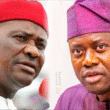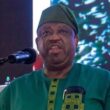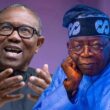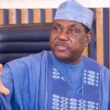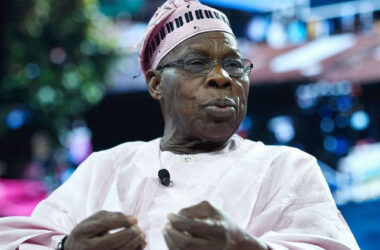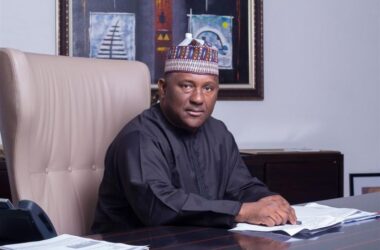The Presidency on Sunday clarified that President Bola Tinubu’s ongoing state visit to Saint Lucia is a major diplomatic and cultural effort, not a leisure trip as suggested by critics.
According to a statement by Bayo Onanuga, the President’s Special Adviser on Information and Strategy, the visit aims to strengthen deep-rooted historical and cultural ties between Nigeria and the Caribbean nation.
The trip, Onanuga noted, is rekindling long-standing connections that date back to the 19th century when Nigerians migrated to Saint Lucia and left cultural footprints that still exist.
From Saint Lucia’s viewpoint, the presence of President Tinubu signals a renewed relationship with Africa, especially Nigeria.
Onanuga noted that the visit is opening new avenues for cooperation in areas such as diplomacy, trade, and culture.
He also stated that the citizens of Saint Lucia have expressed enthusiasm over Tinubu’s visit, seeing it as an opportunity to reconnect with their African roots.
The statement read,” In the mid-19th century, a wave of immigrants from present-day Nigeria arrived in Saint Lucia, bringing cultural and religious practices that persist today.
“Citizens of Saint Lucia are excited that President Tinubu has chosen to visit the island.
“They long to strengthen their bonds with African nations with which they share ancestral links.”
The Presidency described the visit as a major effort within the framework of South-South cooperation and Nigeria’s Four D’s foreign policy strategy- Democracy, Development, Diaspora, and Demography.
It said, “Saint Lucia is the headquarters of the Organisation of Eastern Caribbean States and the gateway to the 15 CARICOM member states.
“The CARICOM states have a combined GDP of over $130 billion, a significant figure in South-South trade discourse.”
Citing diplomatic and historical bonds, Onanuga recalled key historical ties between Nigeria and Saint Lucia, most notably the life and career of Sir Darnley Alexander, a Saint Lucian who served as Chief Justice of Nigeria from 1975 to 1979.
“Sir Darnley Alexander, a Saint Lucian-born jurist who died on February 10, 1989, served as Chief Justice of Nigeria from 1975 to 1979,” it said, adding that, “He first came to Nigeria in 1957, recruited as a legal draftsman by the Western Regional Government of Chief Obafemi Awolowo.”
It explained that Alexander became the acting Director of Public Prosecutions in 1958.
In 1960, he was appointed Solicitor General and Permanent Secretary of the Western Regional Ministry of Justice.
Four years later, he was appointed a judge in the Lagos High Court, and in 1969, the defunct South Eastern State appointed him the chief judge.
He later became the Chief Justice of Nigeria in 1975, succeeding Sir Teslim Olawale Elias.
The presidency also highlighted the contributions of other Saint Lucians, including Neville Skeete, who helped design the Central Bank of Nigeria headquarters, and Sir Darnley’s son Michael, a frontline medical officer during the Nigerian civil war.
On the cultural front, the Presidency stated that Tinubu’s visit aligns with the African Union’s Sixth Region agenda, which recognises the African diaspora as a key development partner.
“Nigeria actively fosters cultural exchange through collaboration in education, culture, and heritage preservation.
“Our cultural exports, including Afrobeats, Nollywood, and literature, are already making a significant impact on Saint Lucia and the wider Caribbean,” it said.
Highlighting Nigeria’s growing cultural footprint, the statement noted, “The Gros Islet Street Party is arguably one of Saint Lucia’s most famous cultural events. It has been held every Friday for over 50 years.
“On the Friday before President Tinubu’s arrival, Afrobeats and Nigerian music dominated the airwaves, a testament to Nigeria’s growing soft power and cultural footprint.”
On democratic values, the Presidency stressed that “Saint Lucia is a stable parliamentary democracy, making it a natural ally for Nigeria, which has enjoyed 26 years of uninterrupted democratic governance.”
During the live coverage of Tinubu’s arrival, a Saint Lucian commentator reportedly described him as a “fighter for democracy.”
Regarding Nigeria’s growing population, the statement said, “Nigeria is projected to become the third most populous country in the world by 2050.
“President Tinubu has consistently emphasised that Nigeria’s youthful population is a driver of economic transformation via education, industrialisation, and innovation.”
As part of his itinerary, President Tinubu is scheduled to visit the Sir Arthur Lewis Community College to deepen educational partnerships.
The delegation also includes members of the Nigerian Technical Aid Corps, who are deployed to ACP countries to provide professional services.
“This assistance is delivered through the deployment of Nigerian professionals to recipient countries to address specific needs,” Onanuga explained.
The statement added that Saint Lucia’s Prime Minister will host a reception for the Nigerian community, where they will meet with the President and his delegation.
“This event is a unique opportunity for the Nigerian community to interact with their President and discuss matters of mutual interest, further strengthening the ties between the two nations,” the presidency said.
Saint Lucia, which gained independence in 1979, has hosted fewer than 10 official state visits.
The last visit by an African leader was President Nelson Mandela’s in 1998 during the 19th CARICOM Heads of Government Summit.
“Therefore, President Tinubu’s 2025 visit, 27 years later, is a historic diplomatic milestone,” the statement said.
The visit will also include a special address by President Tinubu to a joint session of Saint Lucia’s bi-cameral Parliament.
“President Tinubu will address a special joint session of Saint Lucia’s bi-cameral Parliament at the Sandals Grande Saint Lucian Conference Hall, named after former U.S. President Bill Clinton,” Onanuga revealed.
The Presidency concluded its statement by reiterating the significance of the visit, urging Nigerians to see it for what it is—a strategic, historic engagement.
“President Tinubu’s visit is not a vacation, as misrepresented by critics, but a diplomatic and cultural outreach that advances Nigeria’s interests and deepens its global partnerships,” it read.


